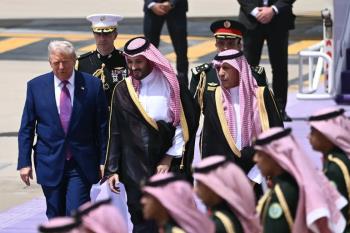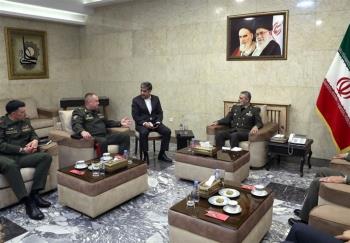Alwaght - Saudi Deputy Crown Prince, Mohammad bin Salman, has recently paid a visit to Paris and signed military and trade contracts worth 12 billion dollars. The event highlights France’s inclination towards tightening bonds with the Arab states of the Persian Gulf. In May 2015, France’s president, Francois Hollande, was the first western high ranking official who attended the Persian Gulf Cooperation Council summit (PGCC). On the other hand, just within the last six months, France and Saudi Arabia sealed an agreement for Riyadh to finance the delivery of 3 billion dollar worth of French weapons to the Lebanese army. In the meantime, France sold Rafale fighter jets to Qatar in a 7 billion dollar deal, and the same type of combat jets to Egypt in a 5 billion dollar contract. All these multi-billion-dollar contracts were facilitated under political and financial supports from the United Arab Emirates.
The close ties between France and Arab countries are seen by experts as an evidence of France’s growing strategic presence in the region. It is also believed that France’s new policy in the West Asia is aimed at easing Arabs’ fears over improved relations between the US and Iran. However, France’s new links with Arab states can also be interpreted as Paris’ unequivocal support for their policies towards the Islamic Republic of Iran. For example, France has been the major western country to provide full military support for Saudi Arabia in its invasion of Yemen, while other western actors are seeking to extricate Saudi Arabia from the quicksand of Yemen.
Arab states can now send a message to Washington that they no longer need US’s support and that they can rely on other countries to move their regional policies forward. In the wake of the unprecedented turmoil in the West Asia, France’s military aid has undoubtedly ensured a more secure status for Arab states. Therefore, Rafale fighter jets are highly valuable for Arab states, and they are planning to employ the jets in the war-hit regions such as Libya, Yemen, or in the so-called anti-ISIS coalition.
However, in order to achieve the highest level of security, Arab states will eventually need to resort to the US as a more powerful actor and enjoy its pivotal military support. So, the fact remains that Arab states’ willingness to expand ties with France is merely prompted by the region’s political developments.
At the same time, France has made significant economic gains through its military support for the Arab states. Hollande has turned France into the major European country to benefit financially from the tensions in the Persian Gulf region as well as the Arab states’ need for the West’s support.
Whether by its full support for the Saudi military aggression on Yemen, or through taking a robust stance against Iran’s nuclear energy program, France has become the closest Western ally of the Arab states, and in return, has made notable economic gains. France’s new policy has drawn the country closer to Arab countries, especially when it comes to its stance on Iran and Syria when Paris aligned with Arab states and sought Bashar al-Assad’s ouster.
However, France has not shouldered the burden of its new strategy. It has neither taken unilateral military steps to prove its alliance with Arab states, nor has it expressed open disagreement with a nuclear deal with Iran. Like most Arab countries, France relies on the US to make big decisions in the region. So, if the US pursues the same goals in the West Asia, France will immediately lose its lucrative business with Arab countries.
Arab states blame all the region’s problems on Iran seeking regional hegemony. They regard Iran’s policy in Syria, Iraq, and Yemen as an attempt to root out the Sunni-dominated political system and to establish a new “Shiite” empire; an issue referred to by the Jordanian king as the “Shiite crescent”. What frets Arab states the most is that once a nuclear deal is hammered out, Iran may adopt an even more belligerent policy in the region. They regard the nuclear agreement as a shield that will spare the Islamic Republic of Iran a war with the US and thus allows the country to maneuver more freely in the region.
Arab states fear that they may have to face Iran alone. To avoid that, they hold on to France as an alternative to the US.
During the PGCC summit at Camp David, Arab leaders urged the US to sign defense treaties and to provide them with conventional weapons in a bid to deter Iran’s military threat. But, they believe that US defense assurance will only contain Iran’s military threat, and cannot reduce its influence in the region.
Arab regimes are concerned that Iran’s “intervention” in the region will change the political and religious structure of the Persian Gulf region. They are also overawed lest Iran has plans to topple Arab monarchies.
This is why the Persian Gulf Arab states have come to believe that they can no longer count on the US military power. They also share the belief that they are the losers of the nuclear deal with Iran. To Arab states, Iran will soon become a nuclear power and this will no more stoke US’s concern.
They also fear that the deal with Tehran may lead to the US turning its back on them. This has caused Arab states to take action to roll back Iran’s power in the region. They can no longer rely on the US to push back against the Iranian influence; rather, they should take on this responsibility and find their own way of countering the Persian country.
They are seeking to thwart Iran’s influence but they cannot rely on America’s military power as a deterrent. They observed Iran’s capability in unconventional warfare (e.g. proxy war) and came to an understanding that in order to enter a symmetric war with Iran, they need to boost their military power.
France will never take serious steps to solve the Arab states’ problems. Although close links between France and the PGCC countries will benefit both sides, yet, they can never build a meaningful strategic alliance. France can make sizable economic gains through maintaining close ties with the Persian Gulf Arab states, but then, it will no longer be considered an influential regional actor, because its cooperation with Arab states will also mean alignment with their policies. More importantly, France’s new policy comes as Arab states are threatening Europe’s interests, whether by giving rise to terrorist groups or causing concerns over staggering numbers of refugees. The Persian Gulf Arab states, in turn, know that no matter how desirable France’s support is, Paris is neither capable of nor willing to take effective action to resolve their major concerns.


























